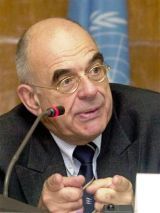UN envoy to Sudan wants powerful nations to back peace in the South
By EDITH M. LEDERER, Associated Press Writer
UNITED NATIONS, Dec 15, 2004 (AP) — The top U.N. envoy to Sudan urged the world’s most powerful nations to use their political clout to ensure that the Sudanese government and southern rebels end their 21-year civil war as promised by Dec. 31.

Jan Pronk said the five veto-wielding permanent members of the UN Security Council – the United States, Russia, China, Britain and France – should become “players” and help the opposing parties cross the last bridge to an agreement that would also be key to ending the separate conflict in Sudan’s western Darfur region.
“Powerful countries should play with power, and that is what I hope,” he said at a news conference.
Pronk said the chances of reaching an agreement by the deadline are good, but neither side has budged on extremely difficult issues related to the size and financing of the army.
If an agreement is signed, he said the 15-country Security Council would adopt a resolution early next year authorizing a wide-ranging UN peacekeeping mission, hopefully with up to 10,000 troops.
The civil war began in 1983 after rebels from the mainly animist and Christian south took up arms against the predominantly Arab and Muslim north. Most of the two million casualties have been caused by war-induced famine.
Both sides have agreed on power and wealth sharing and how to integrate their armed forces. But outstanding issues include the size of the armies of the north and the south and funding for the southern armed forces during the 6½ year period until a referendum is held on autonomy for the south.
Sudanese Vice-President Ali Osman Mohammed Taha and John Garang, leader of the Sudan People’s Liberation Army, began what has been billed as the final round of talks to end the fighting last week. Pronk said he offered UN assistance but both sides told him “we want to do it ourselves, stay away for a while.”
Nonetheless, Pronk said, the five permanent members should make clear that they are no longer divided and the Security Council insists both sides keep the commitment made last month to reach a peace agreement by the end of the year.
The message from the council should be: “We will not accept noncompliance and if there is noncompliance, we will determine who is responsible,” he said.
Pronk said he sees an emerging consensus on how to move ahead and a meeting Thursday in Washington between UN Secretary General Kofi Annan and U.S. Secretary of State Colin Powell will be “extremely important.”
The United Nations already has pledges for the troops, including from southeast Asian countries Pronk wouldn’t identify. But he said it will take six months to deploy the UN force in southern Sudan where it will likely remain through the referendum.
Pronk expressed hope that the African Union will expand its separate 4,000-strong force for Darfur. Currently, only about 900 troops are deployed and Pronk urged international help in solving logistical problems to get the rest of the troops on the ground quickly to deal with the escalating violence between rebel groups, the government and government-backed militias.
